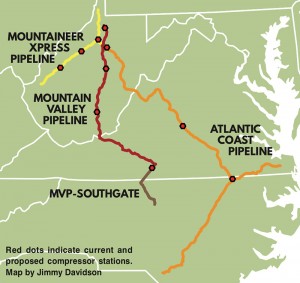Letter to Editor of Charleston Gazette-Mail by Jim Kotcon and Kevin Campbell, August 4, 2020
Doug Reynolds, majority owner of HD Media LLC, which owns the Charleston Gazette-Mail, questioned in a recent op-ed whether anyone wins from the cancellation of the Atlantic Coast Pipeline natural gas project.
Unfortunately, he and a wide range of West Virginia leaders appear to be taking the wrong lessons from the cancellation. If West Virginia leaders want to promote economic development, they need to recognize what really happened here and what it means for the future.
Developers, politicians and other industry leaders blame “regulatory uncertainty” and litigation by environmentalists for the cancellation. But West Virginians should not be fooled: The developers of the pipeline really have only themselves and their bad management decisions to blame.
Courts tend to defer to regulatory agencies, so the court decisions halting the pipeline only could have happened because those violations were real. These were not the result of “regulatory uncertainty,” they were the result of developers trying to ignore the plain language of the law.
For over five years, we have told developers that climate change is real, that building a pipeline on steep slopes with erodible soils requires very careful, site-specific plans to prevent water pollution and that the need for the pipeline was never really demonstrated. Instead of addressing these very real issues, developers continually tried to bulldoze over our objections. Those bad decisions resulted in dozens of violations, successful legal challenges, wasted money and continuous conflict.
Water quality violations from Atlantic Coast are numerous. We saw it coming, we warned regulatory agencies in hundreds of public comments and complaints, and unfortunately, it happened as we forecast. This was not some big surprise, it was the inevitable and easily predictable result of trying to build on West Virginia’s steep slopes without adequate precautions.
The lack of need for the pipeline may have been the real driver for the cancellation. It was dubious from the beginning, driven more by the greed of developers to capture guaranteed returns from ratepayers than from any realistic assessment of market demand. As prices for exported gas collapsed and plans for new power plants were shelved, the economic justification looked more and more contrived. We suspect that if there were a legitimate market need, Atlantic Coast would not have been canceled, regardless of the environmental concerns.
Most importantly, climate change is real. We need to reduce use of fossil fuels quickly and be entirely out within 30 years. Investing billions of dollars in fossil fuel infrastructure would almost certainly never pay off. The passage in Virginia this spring of the state’s Clean Economy Act made that abundantly clear to developers, even if West Virginia politicians remain chained to the failed fossil fuel millstone of the past. Until we recognize the reality of climate change and adopt the needed policies to address it, economic development struggles will continue.
And if West Virginians want jobs, dollars invested in renewables now produce more jobs than fossil fuels. West Virginia continues to miss real job creation opportunities by trying to save a dying fossil fuel industry. Every surrounding state has more jobs in renewables than West Virginia, primarily due to the renewable energy policies chosen by lawmakers.
Reynolds asked, “Who won?” Well, landowners will get to use their property (we hope), so they won. West Virginia streams will be a little cleaner, so we all win that one. Ratepayers do not have to reward developers with billions of dollars for unnecessary costs, so they win big. Most of all, the greenhouse gases will not pollute the atmosphere for decades to come, so planet Earth wins.
Note: Jim Kotcon and Kevin Campbell are with the Sierra Club Chapter in West Virginia.
>>>>>>>>>>>>>>>>>>>>>>>>>>>
See also: The Atlantic Coast Pipeline was canceled. What happens to all the land acquired for it? – Virginia Mercury, July 29, 2020

